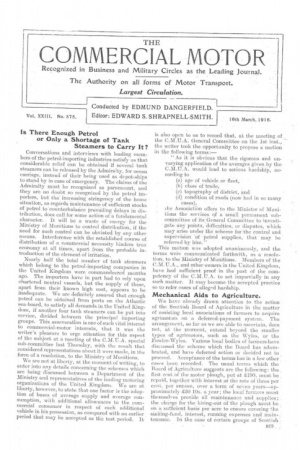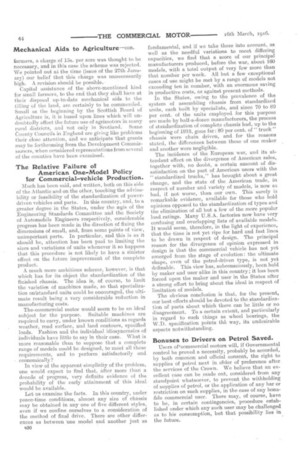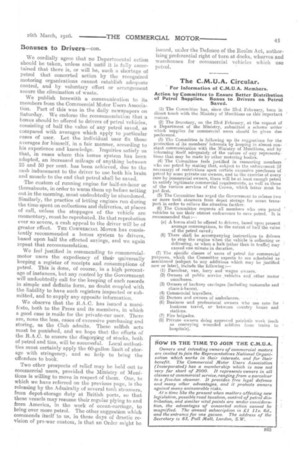Is There Enough Petrol or Only a Shortage of Tank Steamers to Carry It?
Page 1

Page 2

Page 3

If you've noticed an error in this article please click here to report it so we can fix it.
Conversations and interviews with leading members of the petrol-importing industries satisfy us that considerable relief can be obtained if several tank steamers can be released by the Admiralty, for ocean carriage, instead of their being used as depot-ships to stand by in case of emergency. The claims of the Admiralty must be recognized as paramount, and they are no doubt so recognized by the petrol porters, but the increasing stringency of the home situation,. as regards maintenance of sufficient stocks of petrol to 'counterbalance Prevailing -delays in distribution, does call for some action of a fundamental. character. It will be a waste of energy for the Ministry of Munitions to control distribution; if the need for such control can be obviated by any other. means. Interference with the established course: of distribution of .a commercial necessity hinders true economy at all times, apart from the probable introduction of the element of irritation.
Nearly half the total number of tank steamers which belong to the petrol-importing companies in the United Kingdom were commandeered months ago. The importers have in part had to rely upon chartered neutral vessels, but the supply of these, apart from their known high cost, appears to be inadequate. We are definitely assured that enough petrol can he obtained from ports on the Atlantic sea-board, to satisfy all demands in the United Kingdom, if another four tank steamers can be put into service, divided between the principal importing groups. This asseveration is one of such vital interest to commercial-motor interests, that it was the writer's pleasure to urge attention for this aspect of the subject at a meeting of the C.M.U.A. special sub-committee last Thursday, with the result that considered representations about it were made, in the form of a resolution, to the Ministry of Munitions.
• We are not at liberty, at the moment of writing, to enter into any details concerning the schemes which are being, discussed between a Department of the, Ministry and representatives of the leading motoring organizations of the United Kingdom. We are at liberty, however, to state that one factor is the adoption of bases of avepage supply and average consumption, with additional allowances to the commercial consumer in respect of each additional vehicle in his possession, as compared with an earlier period that may be accepted as the test period. It is also open to us to record that, at the meeting of the C.-M.U.A2: General Committee on the 1st inst., the writer took the opportunity to propose a motion in the following terms:— " As it is obvious that the rigorous and unvarying application of the averages given by the C.M.U.A. would lead to serious hardship, according to (a) age of vehicle or (h). class of trade, (c) topography of district, and (d) condition of roads (now bad in so many cases), the Association offers to the Minister of Munitions the services o,f a small permanent subcommittee olits. General Committee to investgate any points,' diffictilties; or 'disputes, which may arise under the scheme for the control and supervision of .petrol supplies, that may be referred .by him."
This motion was adopted unanimously, and the terms were communicated forthwith, as a resolution, to the Ministry of Munitions. Members of the C.M.U,A., and other owners in the United Kingdom, have had sufficient proof in the past of the competency of the C.M.U.A. to act impartially in any such matter. It may become the accepted practice so to refer cases of alleged hardship.
Mechanical Aids to Agriculture.
We have already drawn attention to the action of the Scottish Board of Agriculture in the matter of assisting local associations of farmers to acquire agrimotors on a .deferred-payment system. The arrangement, so far as we are able to ascertain, does not, at the moment,. extend beyond the smaller types of agrimotors, such as the Wyles, or the Fowler-Wyles. Various local bodies of farmers have discussed the scheme which the Board has adumbrated, and have deferred action or decided not to proceed. Acceptance of the terms has in a few other . eases been recorded. The usual terms which the 'Board of Agriculture suggests are the following : the, flyst cost, of the motor plough, put at k190. must be , repaid, together With interest at the rate of .three per cent. per annum, over a term of seven years—approximately k:30 10s. a year ; the local farmers must themselves provide all maintenance and supplies; the charge for the hiring-out of the plough must be on 4 sufficient baSis. per acre to ensure covering the sinking-fund, interest, running expenses "and main. tenance. In the case of certain groups of Scottish iartners, a charge of 15s. per acre was thought to be necessary, and in this case the scheme was rejected. We pointed out at the time (issue of the 27th January) our belief that this charge was unnecessarily high. A revision should be possible.
Capital assistance of the above-mentioned kind for small farmers, to the end that they shall have at their disposal up-to-date mechanical aids to the tilling of the land, are certainly to be commended. Small as the beginning by the Scottish Board of Agriculture is, it is based 'upon lines which will undoubtedly affect the future use of agrirnotors in many rural districts, and not only in Sciatiand.Some County Councils in England are giving like problems their close attention, and we anticipate that grants may be forthcoming from the Development Commissioners, when considered representations from several of the counties have been examined.
The Relative Failure of American One-Model Policy for Commercial-vehicle Production.
Much has been said, and written, both on this side of the Atlantic and on the other, touching the advisability or feasibility of the standardization of powerdriven vehicles and parts. In this country, and, to a greater degree in the States, under the EerfiS of the Engineering Standards Committee and the Society of Automobile Engineers respectively, considerable progress has been made in the direction of fixing the dimensions of small, and, from some points of view, unimportant parts. In particular, and this is as it should be, attention has been paid to limiting the sizes and variations of unite whenever it so happens that this procedure is not likely to have a sinister effect on the future improvement of the complete product.
A much more ambitious scheme, however, is that which has for its object the standardization of the finished chassis. The idea is, of course, to limit the varieties of machines made, so that specialization orestandard units could be encouraged, the ultimate result being a very considerable reduction in manufacturing costs.
Thecommercial motor would seem to be an ideal subject for the purpose. Suitable machines are required to carry, under known conditions as regards weather, road surface, and land contours, specified loads. Fashion and the individual idiosyncrasies of individuals have little to say in their case. What is more reasonable than to suppose that a complete range of models could be designed, to meet all these requirements, and to perform atisfactorily and. economically ?
In view of the apparent simplicity of the problem, one would expect to find that, after more than a decade of progress, very definite evidence of the probability of the early attainment of this ideal would be available.
Let us examine the facts. In this country, under peace-time conditions, almost any size of chassis may be obtained in any one of five different styles, even if we confine ourselves to a consideration of the method of final drive. There are other differences as between 'one model and another just as fundamental, and if we take these into account, as well as the needful variations to meet differing capacities, we find that a score of our principal manufacturers produced, before the war, about 160 models, with a. total output of very few more than that number per week. All but a few exceptional cases of use might be met by a range of models not exceeding ten in number, with an enormous saving in productive costs, as against present methods. In the States, owing to the prevalence of the system of assembling chassis from standardized units, each built by specialists, and since 70 to 80 per cent. of the units employed for this purpose are made by half-a-dozen manufacturers, the process of standardization of complete chassis had, up to the beginning of 1913, gone far : 80 per cent. of " truck" chassis were chain driven, and for the reasons stated, the differences between those of one maker and another were negligible.
The incidenee of the European war, and its attendant effect on the divergence of American sales, together with, no doubt, a certain amount of dissatisfaction on the part of American usera with the "standardized trucks," has brought about a great change, and the state of the American trade, in respect of number and variety of models, is now as bad, if not worse, than our own. This surely is remarkable evidence, available for those who hold opinions opposed to the standardization of types and the elimination of all but a few of the more popular load ratings. Many U.S.A. factories now have very confusing and overlapping lists of available models. it would seem, therefore, in the light of experience, that the time is not yet ripe for hard and. fast lines to he drawn in respect of design. The principal reason for the divergence of opinion expressed in design is that the commercial vehicle has not yet emerged from the stage of evolution: the ultimate shape, even of the petrol-driven type, is not yet definable. This view has, subconsciously, been held by maker and user alike in this country ; it has been forced. upon the maker and user in the States after a strong effort to bring about the ideal in respect of limitation of models.
The obvious conclusion is that, for the present, our best efforts should be devoted to the standardization of parts about which there can be little or no disagreement. To a certain extent, and particularly in regard to such things as wheel bearings, the W.D. specification points the way, its undesirable aspects notwithstanding.
Bonuses to Drivers on Petrol Saved.
Users of'commercial motors will, if Governmental control be proved a necessity, probably be accorded, by both common and official consent, the right to supplies of petrol next in °Her of preference after the services of the Crown. We believe that an excellent case can be Made out, considered from any standpoint whatsoever, to prevent the withholding of supplies of petrol, or the application of any bar or restriction on such supplies, in the case of any bonafide commercial user. There may, of course, have to be, in certain contingencies, procedure established under which any such user may be challenged as to his consumption, but that possibility lies in the future. We cordially agree that no Departmental action should be taken, unless and until it is fully ascertained that there is, or will be, such a shortage of petrol that concerted action by the recognized motoring organizations cannot establish adequate control, and by voluntary effort or arrangement secure the elimination of waste.
We publish herewith a communication to its members from the Commercial Motor Users AssociatiOn. Part of this was in the daily newspapers on Saturday. We endorse the recommendation that a bonus should he offered to drivers of petrol vehicles, consisting of half the value of any petrol saved,_ as compared with averages which apply to particular cases of user. Let the individual user fix those averages for himself, in a fair manner, according to his experience and knowledge. _ Inquiries satisfy us that, in cases where this bonus system has been adopted, an increased mileage of anything between 25 and 50 per cent, has been achieved, due to the cash inducement to the driver to use both his brain and muscle to the end that petrol shall be saved.
The custom of running engine for half-an-hour or thereabouts, in order to warm them up before setting out in the morning, must undoubtedly be abandoned. Similarly, the practice of letting engines run during the time spent on collections and deliveries, at places of call, unless the stoppages of the vehicle are momentary, must be reprobated. Be that reprobation ever so severe, a cash appeal to the driver will be of greater effect. THE COMMERCIAL MOTOR has consistently recommended a bonus system to drivers, based upon half the effected savings, and we again repeat that recommendation.
We feel justified in commending to commercialmotor users the expediency of their universally keeping a register of receipts and consumptions of petrol. This is done, of course, in a high percentage of instances, but any control by the Government will undoubtedly call for the keeping of such reeords in simple and definite form, no doubt coupled with the liability to have such registers inspected or submitted, and to supply any apposite information.
We observe that the li.A.C. has issued a manifesto, both to the Press and its members, in which a good case is ma:de for the private-car user. There are, none the less, cases of excessive purchasing and storing, as the Club admits. These selfish acts must be punished, and we hope that the efforts of the R.A.C. to ensure the disgorging of stocks, both of petrol and tins, will be successful. Local authorities must certainly apply the 60-gallon limit of storage with stringency, and so help to bring the offenders to book.
Two other prospects of relief may be held out to commercial users, provided the Ministry of Munitions is willing to move in respect of them. One, to which we have referred on the previous page, is the releasing by the Admiralty of several tank steamers, from depot-storage duty at British ports, so that these vessels may resume their regular plying to and from America, in the work of ocean-carriage, to bring over more petrol. The other suggestion which commends itself to us, in these days of drastic revision of pre-war custom, is that an Order might be issued, under the Defence of the Realm Act, authorizing preferential right of turn at docks, wharves and warehouses for commercial vehicles which use petrol.
The C.M.U.A. Circular.
For Information of C.M.U.A. Members.
Action by Committee to Ensure Better Distribution of Petrol Supplies, Bonus to_ Drivers on Petrol Saved.
(1) The Committee has, since the 23rd February, been in direct touch with the Ministry of Munitions on this important matter.
(2) The Secretary, on the 23rd February, at the request of a Department of the Ministry, submitted .a scheme under which supplies for commercial users should be given due preference. (3) The Committee is following up its suggestions for the protection of its members' interests by keeping in almost constant communication with the Ministry of Munitions, and by informing itself adeqnately of the nature of any representations that may be made by other motoring bodies. (4) The Committee feels justified in reassuring members who use petrol by stating that, subject to the enforcement (if necessary) of restrictions upon certain excessive purchases of petrol by some private-ear owners, and to the exercise of every care by commercial owners, there will be at least enough petrol to satisfy legitimate commercial requirements, as well as those of the various services of the Crown, which latter must be put first. (5) The Committee has urged the Government to release two or more tank steamers from depot storage for ocean transport in order to relieve the situation further. (6) The Committee requests all members who own petrol vehicles to use their utmost endeavours to save petrol. It is recommended that (a) A bonus shall be offered to drivers, based upon present average consumptions, to the extent of half the value of the petrol saved ;
(b) There shall be accompanying instructions to drivers to stop the engine when the vehicle is collecting or delivering, or when a halt(other than in traffic) may exceed one minute in duration.
(7) The sPecific classes of users of petrol for commercial purposes, which the Committee expects to see scheduled as sanctioned (subjeet to any additions which may be justified now or later), include the following (I) Parcelcar, van, lorry and 'wagon owners.
(2) Owners of public .service vehicles and other motor omnibuses.
Owners of hackney carriages (including motorcahs and chars-a-ba nes).
Commercial travellers.
Doctors and owners of ambulances.
Business and professional owners who use carsfor business travel, or between country house and stations.
(7) Fire brigades. (5) Private owners doing approved patriotic work (such as conveying wounded soldiers from trains to hospitals).




















